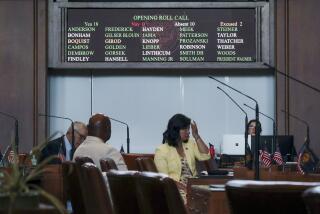Senate beats back filibuster limits
- Share via
Reporting from Washington — A Democratic-led drive to limit the power of the filibuster to stall legislation faded Thursday in favor of more modest reforms, showing that not even an era of unprecedented political obstruction could convince senators to change the way they do business.
The Senate beat back legislation championed by junior Democrats who have grown frustrated with the ability of a single senator to block legislation unless a supermajority of 60 can be mustered, a tactic the Republican minority has used to great success.
The newer members, along with a few veterans, argued that the Senate had succumbed to institutional dysfunction because of the filibuster, which allows senators to thwart the will of the majority — much the way epic filibusters of a previous generation stalled civil rights bills, they said.
Yet it was precisely the Founding Fathers’ vision of the Senate as a slower-moving legislative body, one that tempers legislation passed quickly by a simple majority in the House, that helped convince senators to retain the status quo.
With Republicans now in control of 47 Senate seats, Democrats can envision scenarios in which just four more votes would be needed to overturn President Obama’s signature achievements, or to advance GOP initiatives coming from the GOP-controlled House.
And with nearly two dozen Democratic Senate seats up in the 2012 election, the prospect of a GOP majority is in sight.
So senators overwhelmingly agreed to modest changes that would no longer allow senators to anonymously block bills or engage in a favorite stall tactic: reading entire texts of legislation on the Senate floor.
The filibuster has been put to unprecedented use in the last decade as Washington has become hyperpartisan.
The result has been a procedural arms race that some say has turned the chamber once known as the world’s greatest deliberative body into a gridlocked relic.
Sen. Tom Harkin (D-Iowa) has long championed reducing the supermajority needed to break a filibuster to a simple majority of 51 votes. But his colleagues rejected that idea Thursday, 84-12.
“Both parties appear to be afraid of majority rule.... [They] fear the American people,” Harkin said.
Republicans defended their use of the filibuster, arguing that they have been shut out of the legislative process.
“It’s like telling us we’re joining the Grand Ole Opry and you can’t sing,” said Sen. Lamar Alexander (R-Tenn.). “The truth is, on both sides of the aisle, we would like to see the Senate function in a different way.”
In the end, the yearlong effort led by Sen. Tom Udall (D-N.M.) to alter the Senate procedures came to a close in the time-honored way so many decisions are made in the chamber — through a consensus deal negotiated by the leaders.
Senate Republican leader Mitch McConnell of Kentucky and Majority Leader Harry Reid of Nevada reached an agreement that would allow for votes on several proposals. Senators voted 92-4 to end a senator’s right to secretly block a bill or nomination for more than two days, requiring him or her to publicly disclose the obstruction.
They also voted 81-15 to block senators from demanding the full reading of an amendment on the Senate floor, as was done last year to stall Obama’s healthcare bill, so long as the amendment has been posted for 72 hours.
The other votes, including one that would have required senators to remain on the floor while they filibustered, like actor Jimmy Stewart in the film “Mr. Smith Goes to Washington,” failed.
McConnell and Reid also agreed to reduce the number of White House nominations requiring Senate approval.
Finally, the leaders agreed to play nicely: McConnell will use the filibuster with “discretion”; Reid will prohibit Republican amendments only “infrequently.”
After that, it’s up to the next generation of leaders to work out a deal.
More to Read
Get the L.A. Times Politics newsletter
Deeply reported insights into legislation, politics and policy from Sacramento, Washington and beyond. In your inbox twice per week.
You may occasionally receive promotional content from the Los Angeles Times.











